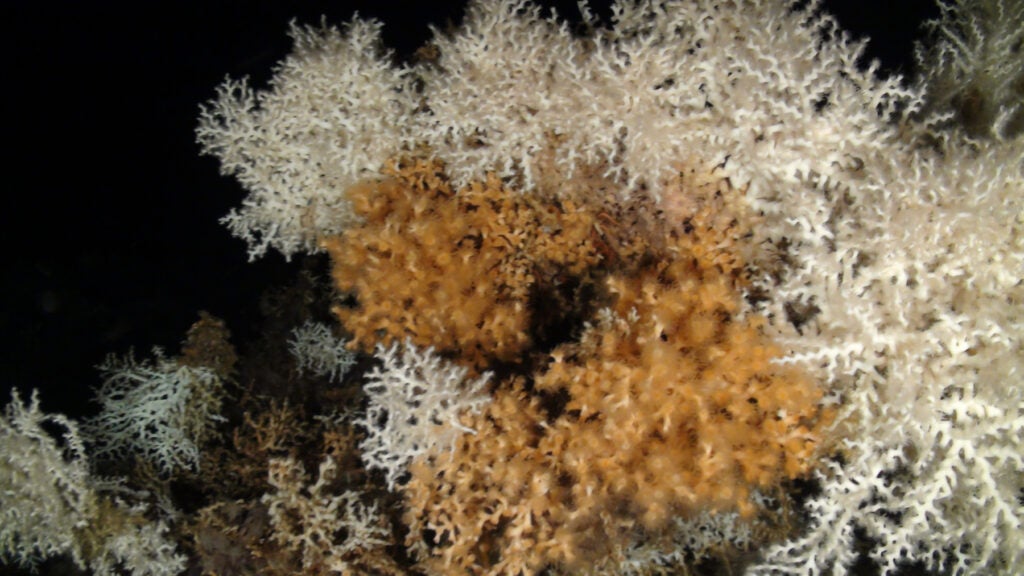Mediterranean countries unite to protect unique deep-sea coral from fishing impacts
Press Release Date: November 10, 2023
Location: Split
Contact:
Emily Fairless | email: efairless@oceana.org | tel.: +32 478 038 490
The measures will protect Cabliers Bank, the only cold-water coral reef known to be growing in the Mediterranean and first researched by Oceana
Mediterranean states also agree to adopt measures to act against those that do not comply with fishing rules
Today, Mediterranean countries have agreed to ban any kind of bottom fishing, including destructive fishing like bottom trawling, in a 400 km2 area around the unique deep-sea coral of Cabliers Bank in 2024. The measure will prevent any deterioration of this fragile biodiversity hotspot located in the Alboran Sea between Spain and Morocco. The decision took place at the General Fisheries Commission for the Mediterranean’s (GFCM) annual meeting.
Cabliers Bank is a seamount that harbours semi-pristine species such as deep-sea white corals (Desmophyllum pertusum and Madrepora oculata) and offers shelter and nursery for several commercial stocks such as Norway lobster and blackspot seabream. The coral mound is over 400,000 years old. Bottom trawling can destroy such fragile ecosystems in just one passing.
Vera Coelho, deputy vice-president at Oceana in Europe, said: “The decision to protect the Cabliers reef from bottom trawling is a great win for marine ecosystems and is an example to be followed by Mediterranean countries to deliver their conservation targets and rebuild fish stocks. We particularly commend the leadership of the European Commission, Morocco, and Algeria in this decision.”
In March 2023, the Spanish National Research Council (ICM-CSIC) carried out an international research campaign to Cabliers Bank which confirmed the uniqueness and rich biodiversity around the reef and reinforced the need for its protection.
Claudio Lo Iacono, senior scientist at the Marine Sciences Institute of the Spanish National Research Council (ICM-CSIC), said: “Cabliers Bank is a unique deep-sea sanctuary where corals and associated species, including commercial and critically endangered ones, thrive, spawn and grow under the most optimal conditions throughout their entire life cycle. The high fish biomass here likely spills over and benefits surrounding areas. Protecting Cabliers is the wisest thing we can do.”

Following this GFCM decision, another international research expedition will take place in 2024 to help define a permanent closure area, for the GFCM to finally adopt a Fisheries Restricted Area (FRA) in 2024.
During the annual meeting, Mediterranean countries also agreed to adopt measures that will allow them to take action against members that persistently fail to adhere to gear restrictions or stop trawlers from fishing illegally in no-trawl zones. Following the example of similar regional fisheries management organisations, the GFCM will now have a system in place to put the onus on members to fulfill additional control or data reporting requirements. This is critical to stop years of inaction and to create a culture of compliance. We call on the GFCM to strengthen this system in the coming years to also be able to act against members failing to meet their reporting or control requirements.
Background
Oceana first investigated Cabliers Bank in an at-sea expedition in 2011, followed by one by the ICM-CSIC in 2015. Together, both organisations officially proposed to create a FRA around the Cabliers reef at the GFCM meeting in April 2022. This would be the first Fisheries Restricted Area in the Alboran Sea.
The adoption of the FRA around Cabliers Bank would help deliver commitments from the 2017 MedFish4Ever Declaration. Oceana criticised GFCM fisheries ministers this year for not doing enough, including being too slow in designating FRAs.

